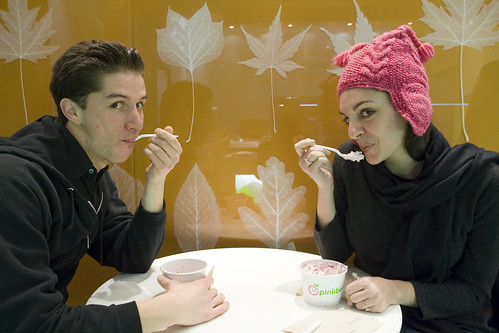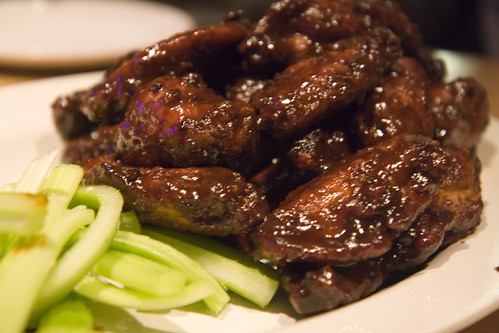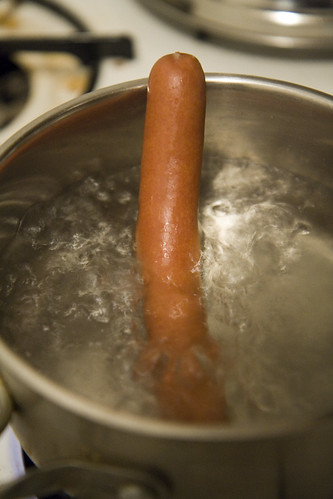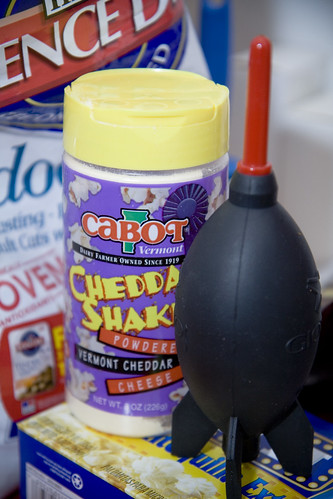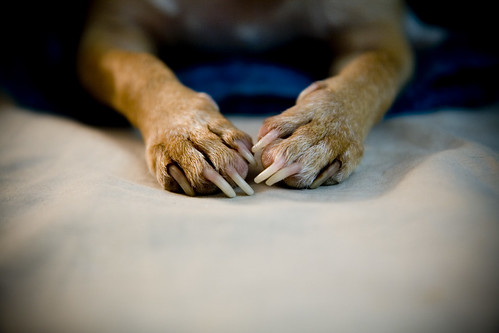
Author: MASadmin
365 #104: Down but not out
365 #103: Pinkberry
365 #102: No Buffalo Wing Shortage Here
Book Review: The Engaged Groom
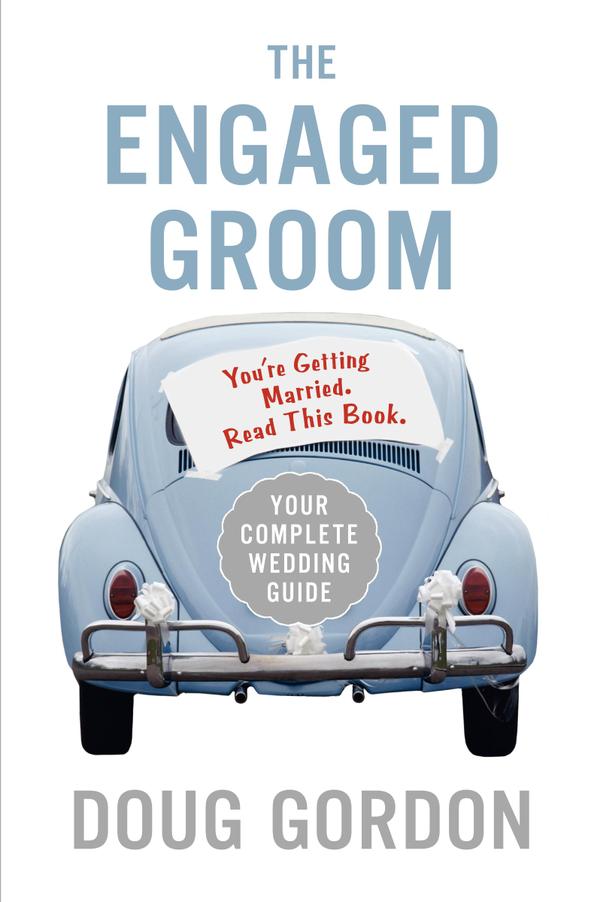
The Engaged Groom, by Doug Gordon, first started showing up on bookshelves nationwide in 2005. It’s a book that I had high hopes for. In fact, I even stole the concept of an “engaged groom” from this book and tried to make it my own. In a mass consumeristic culture where weddings, which are marketed as merely affairs that a groom shows up at, a book where where a groom tries to take an active role in the planning process is a good idea. It’s his day too, right? And as more and more couples wait they have their own financial resources to fund their own extravagant bash, a groom should be active. Who enjoys just writing a check without any active part in what’s being bought? No longer can grooms merely just accept the role that culture envisions them to play. The grooms are not merely some “white knight” and cannot be a mere Ken doll to his own wedding. I can’t help but think that the spending patterns of Americans, the emptying of their bank accounts and the increase in their credit card debt, had a large impact on how weddings are marketed today. Turning on the TV, from TLC to the Style channel, weddings are events that are reserved for the brides and their storybook fantasies. Wedding magazines push this concept to the point where begging your family for money like a three year old is considered good form.
But, like the current credit crisis, this can’t last forever. There are too many women in the workforce, too little disposal income, and too much income inequality in the US for it to last forever. An Engaged Groom is a groom trying to bring the second half of the future married couple into the marketing process. If business start convincing a groom to buy their products (above and beyond a lap dance and a cigar bar), there’s a good chance these companies will learn that grooms can make decisions too. It’s like the recent period in California when gay marriages were allowed – businesses immediately tried to tap that money source. And as more grooms become engaged in the process, this is what’s going to change how weddings are marketed and viewed in the US. No more images of the woman begging for some luxury and the groom saying no. Instead, weddings will be seen as they should be – a group project where the responsibilities, opinions, and the wedding itself is a product of the couple and not some externally imposed marketed event. It doesn’t mean that the wedding can’t look like a fairy tale – if that’s what the couple wants, that’s what they should have. What it means is that weddings don’t default to the fairy tale without either part of the couple being involved with the process. So this is what I thought The Engaged Groom might be – an initial attempt into the pop culture wedding wars to help bring grooms back to the wedding table, front and center. Close, but no cigar.
I was hoping for a book with teeth and this isn’t it. It’s great at what it wants to be – a mellow and very general guide for grooms who have never heard of weddings before. There are some recommendations on what to do, some stories, and a detailed diagram on how to tie a bow tie. All of this is good, I guess, but it comes off as lacking the teeth and assertiveness I feel a book about being an Engaged Groom should have. I understood the idea behind invitations, save the dates, etc. What I don’t understand, nor do I really accept, is how the wedding machine dictates the default behavior behind these items. To me, as an Engaged Groom, things like that should be questioned. The less they’re questioned, and the more they’re accepted, the less engaged a groom becomes. Grooms are then merely an accessory to the tradition of the event i.e. they are at the whim of the wedding planing skills of the bride and her mother. True, this doesn’t necessarily have to be the case and might not be the case with the author and his wedding, but a rough general guide of the wedding process actually leads to this general conclusion. The easiest way to go against this grain would have been for the author to get into the nitty gritty details of his own wedding. He tried a little but he should have done more. How did he attack it. How did he make decisions. What did he accept and reject. What did he learn. Don’t hide this knowledge with general thoughts and feelings – throw your opinion around. An Engaged Groom just doesn’t react to choices by the bride or her mother, an Engaged Groom initiates. I wish I had seen more of that in the book.
This problem struck me the most when the author started talking about bachelor party. He defaults to a general discussion of strippers and strip clubs. Why? Because, and he even mentions this, this is what is usually seen at a bachelor party. He questions it a bit, attempts some commentary on the stereotypical male need to see boobs, but any teeth he had in this chapter vanishes when he acts, at first, as if he is against the idea of strippers and then mentions, near the end of the chapter, that he and his groomsmen went to Las Vegas and had a huge stripper fest. His reasoning behind this was that his groomsmen organized it and when in Rome, do as the Romans do. It would have been nice if, rather than try to make this guide cover everything about bachelor parties and strippers, if he just dropped the pretense of his being against bachelor parties and just embraced what happened to him and told his story. Do we need to read all the quotes from “real women” about strippers? No. Did we need to hear more about how his final bachelor party decision was reached, what they did, and how he engaged the process? Yes.
Time and time again, the default behavior of the American Wedding Machine is unquestioned and grooms are taught, and blindly accept, that they should be accessories to their own wedding day. It’s pretty obvious that this default behavior doesn’t work for everyone and is increasingly more and more ineffective as the culturally defined spheres of women and men finally break down to the point where they’re no longer significant. Does questioning the American Wedding Machine necessarily mean that traditions and behaviors will change? No. Can a bride still look like a cupcake and call herself a princess? Of course. But what questioning does mean is that the general consciousness of a wedding (and a marriage) will be raised and this is not a bad thing.
365 #101: HOT DOG
Korean Shows are awesome. I give you “We Got Married”
One great thing about having a roommate who speaks Korean is that you get to hear about all the cool variety shows that cover Korean tv. They are quite different from American reality shows. Sure, they have contestants, contests, and celebrities, but the shows are more gimmicky and less serious than the shows in the US. I don’t understand them but the simple fact that the Korean subtitles on their reality shows are the producers making commentary about the show, while you watch it, is something that I enjoy. It’s like they understand that watching your tv is interactive – if you’re not making commentary, yelling at the screen, or rolling your eyes so loud your neighbors complain about the noises, then you’re not getting the whole TV watching experience.
One show is called We Got Married. The premise is simple. Celebrities are teamed up together to live as “newly weds”. Every week they have a new challenge to complete and the show is basically the couples watching themselves compete while giving their own commentary after it happened. After 100 days together, the couple celebrates their “marriage” by having wedding photography done. My roommate has decided that this is how her wedding pictures are going to turn out even if she has to go to South Korea to get them done.
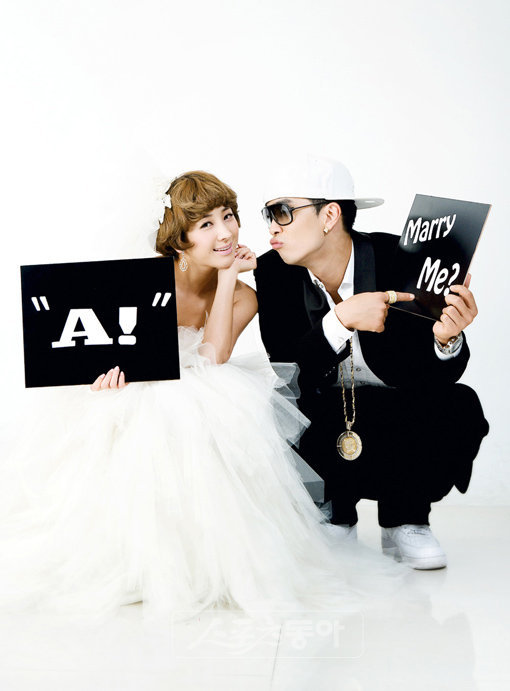
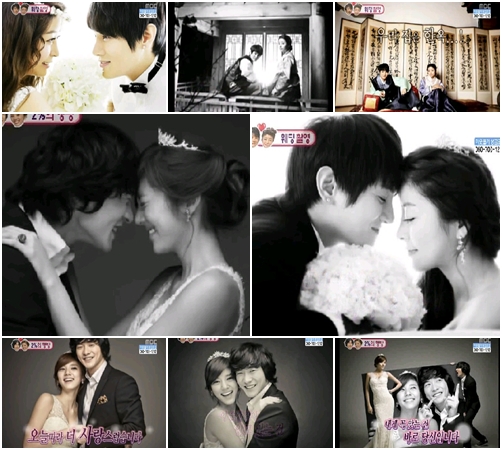
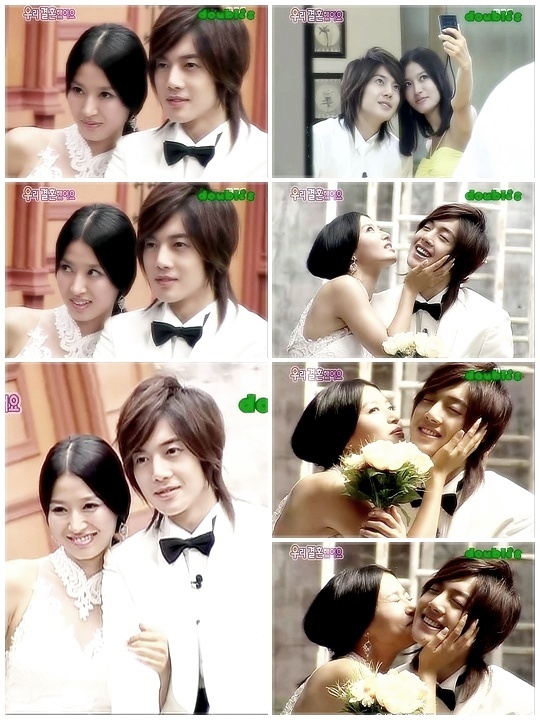
TLC needs to get this show and Americanize it. I would watch.
365 #100 : A Science! Diet
Inspiration Boards
I’m not going to lie, I find inspiration boards interesting. The concept behind them is easy – it’s merely a collection of images to match your wedding scheme. If you have a color and a season, you have all you need. But, even with my professional background, I’m a complete fail when it comes to these. The idea of trying to put together a complete collage of inspirational wedding pictures is daunting. I haven’t even been able to organize the magazine articles and ads I clip from men fashion magazines – there’s no way I could throw an inspiration board together quickly.
But she can.
Here’s the board she made for my fiancee. She told her that our color was white and it would be in the Spring.

Neat, no?
The idea behind them is not to look for perfection and find every nicknack that is going to be in your reception hall. The idea is to merely try to quickly get an overall sense of what you’re going for with the overall look and feel of the wedding. And sometimes the best person to do that is a complete stranger on the internet.

